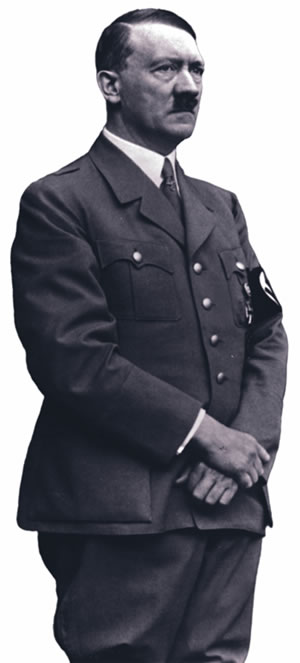
Hitler’s aim in the East was very clear: acquiring Lebensraum in the East up to the Ural Mountains. These lands were occupied by groups that Hitler and Nazism despised: Bolsheviks, Slavs and Jews. Under the New Order, these peoples would either become slaves under German overlords or would be exterminated. He was to state in 1942: “If we do not complete the conquest of the East utterly and irrevocably, each successive generation will have war on its hands”. For him the war in Russia was a racial conflict, in which the racially superior German Aryan race was locked in a struggle with the “sub-human” Slavs. This made retreat in the face of “inferior” peoples unimaginable, for the Führer could not conceive of the racially inferior Slavs being able to defeat a superior race. As he stated on the eve of Kursk: “Germany needs the conquered territories or she will not exist for long. She will win hegemony over the rest of Europe. Where we are - we stay.”
The racial dimension to the war on the Eastern Front would adversely affect his strategic decisions, but Hitler was not a military imbecile. During the inter-war years he had read a great deal of military history and had acquired a deep knowledge of the theory of war. He was certainly intelligent, bold, creative and genuinely indifferent to human suffering, all the attributes needed in a capable commander. He had fought in the trenches in World War I, and this experience gave him, he believed, an insight into warfare that many of the army generals lacked. In the first three years of the war he conquered Poland, Norway, the Low Countries, France, the Balkans and most of European Russia. These outstanding successes gave him an inflated view of his own abilities. The early war years of World War II had seemingly proved this when, often against the advice of his senior commanders, he had taken decisions that had proved correct. The best example was in December 1941, when the Germans faced defeat before the gates of Moscow. His generals urged retreat; the Führer demanded that the troops stand and fight where they were. The front held - just - thus vindicating his decision.
Two things resulted from Hitler’s disagreements with his generals at the end of 1941. First, his mistrust of the professional officer class increased; second, he came to believe that “National Socialist will” alone could turn military defeat into victory. Thus, when the Sixth Army was surrounded in Stalingrad, he refused to order it to break out to the west, believing that if his troops stood where they were he could organize a relief operation. All they needed was the will to stand and fight. Things were very different for the half-starved and battered troops in the city, of course, who faced the reality of being trapped with little hope of relief. The result was inevitable: Stalingrad fell.
Stalingrad made Hitler even more determined to run the war in the East the way he wanted, and increased further his mistrust of his “defeatist generals”. Before the war, he appointed himself supreme commander of the armed forces and, through the Armed Forces High Command (Oberkommando der Wehrmacht), imposed his will on the army, navy and air force. In the early war years, his senior officers were glad to go along with the Führer’s wishes; after all, they had shared in his victories and been showered with honours and riches. It was only after Stalingrad that many generals came to see the negative side of Hitler’s obstinacy. Those who disagreed with him were sacked, which cost the army such capable commanders as Manstein and Guderian. As defeat followed defeat on the Eastern Front, Hitler increasingly withdrew into a fantasy world, trusting in the ability of “wonder weapons” to reverse the situation. By the time the Red Army reached Berlin in 1945, Hitler was a physical and mental wreck. Absolving himself of all responsibility for the outbreak of war and Nazi Germany’s impending defeat, he shot himself on April 30, 1945.
